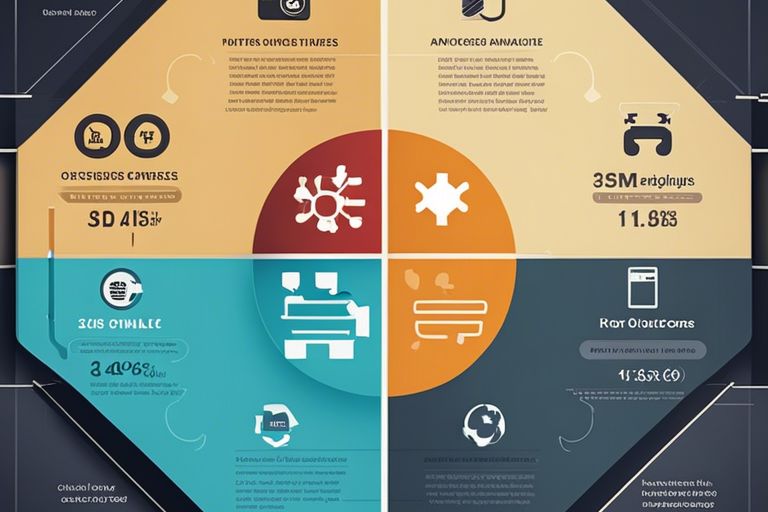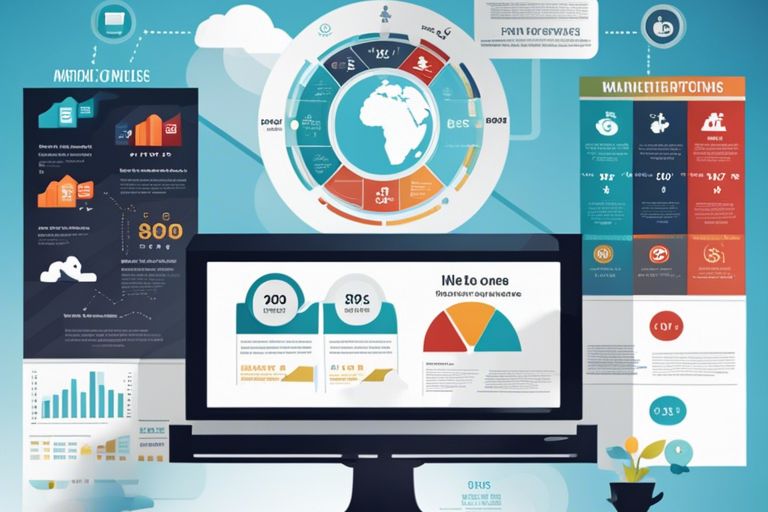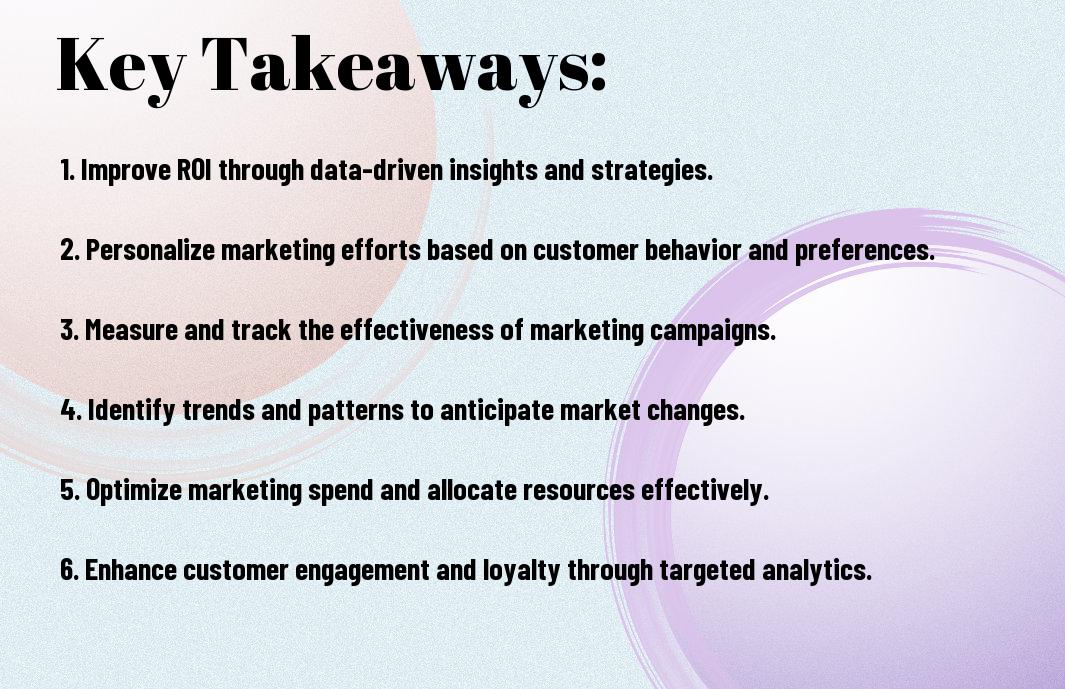Most successful marketing strategies today rely heavily on data-driven insights to make informed decisions. Analytics plays a crucial role in deciphering consumer behavior, identifying trends, and measuring the effectiveness of marketing campaigns. By harnessing the power of data analytics, businesses can personalize their messaging, target the right audience, and allocate resources efficiently. However, it’s important to note that without accurate data and proper analysis, marketing decisions can easily go off track, resulting in wasted resources and missed opportunities.
Key Takeaways:
- Data-driven decisions: Analytics help marketers make informed decisions based on data rather than pure intuition or assumptions.
- Optimizing marketing strategies: By analyzing customer behavior and preferences, marketers can tailor their strategies to better reach their target audience and improve ROI.
- Measuring and tracking performance: Analytics allow marketers to track the performance of their campaigns in real-time, identify areas for improvement, and make adjustments for better results.
Data Collection and Management
Sources of Marketing Data
With the advancement of technology, marketers have access to a vast array of data sources to inform their marketing decisions. These sources include customer interactions, website analytics, social media metrics, market research studies, and more. By leveraging these sources, marketers can gain valuable insights into consumer behavior, preferences, and trends to tailor their strategies effectively.
Ensuring Data Quality and Integrity
Collection. It is crucial for marketers to ensure the quality and integrity of the data they collect for making informed decisions. Ensuring data quality involves implementing processes to clean and validate data, eliminating duplicates, inaccuracies, and inconsistencies. Integrity is paramount to avoid making decisions based on flawed or incomplete information which can lead to costly mistakes in marketing campaigns and strategies. By prioritizing data quality and integrity, marketers can confidently rely on their data for driving successful marketing initiatives.
Analytics Techniques in Marketing
Even before the digital age, marketers have always relied on data to make informed decisions. Today, with the evolution of technology, data analytics plays a vital role in shaping marketing strategies. According to Marketing with Data Analytics: The Importance of Data- …, the use of analytics in marketing decisions is not just a trend but a necessity in the competitive landscape of today’s business world.
Descriptive Analytics for Marketing Insights
Analytics can provide valuable insights into past marketing performance through descriptive analytics. By analyzing historical data, marketers can understand trends, patterns, and customer behavior to optimize marketing campaigns, improve ROI, and make data-driven decisions.
Predictive Analytics and Marketing Forecasting
Marketing decisions are becoming more sophisticated with the integration of predictive analytics. Marketers can now forecast future trends, customer behavior, and outcomes of marketing campaigns using advanced algorithms and machine learning. This enables businesses to proactively adjust their strategies, personalize customer experiences, and stay ahead of the competition.
With the use of predictive analytics in marketing, companies can identify potential risks and opportunities, allocate resources more effectively, and maximize their marketing efforts. By leveraging predictive analytics, businesses can gain a competitive edge and drive success in today’s data-driven marketing landscape.
Application of Analytics in Marketing Strategies
Customer Segmentation and Targeting
For effective marketing strategies, customer segmentation and targeting play a crucial role. By using analytics, businesses can divide their customers into different segments based on demographics, behavior, or preferences. This enables companies to create targeted campaigns that resonate with specific customer groups, leading to higher engagement and conversion rates.
Personalization and Customer Experience Enhancement
For personalized marketing efforts and enhanced customer experiences, analytics is necessary. Through data analysis, businesses can understand individual customer preferences and behaviors, allowing them to tailor their marketing messages and offers accordingly. Personalization not only increases customer satisfaction but also fosters loyalty and retention.
Segmentation: By segmenting customers into different categories, businesses can create personalized marketing campaigns that are more likely to resonate with each group’s needs and preferences. This ultimately leads to increased customer engagement and brand loyalty.
Campaign Effectiveness and ROI Measurement
To make informed decisions, measuring campaign effectiveness and return on investment (ROI) is critical. Analytics can provide valuable insights into the performance of marketing campaigns, helping businesses understand which strategies are delivering the best results and which need optimization. By tracking key metrics like conversion rates and customer acquisition costs, businesses can improve their marketing efforts and maximize ROI.
Campaign: Analyzing campaign performance through metrics such as click-through rates, conversion rates, and sales attribution allows businesses to fine-tune their strategies for better results. By continuously monitoring and optimizing campaigns, companies can ensure they are maximizing their marketing budget and achieving their business objectives.
Price Optimization
On the pricing front, analytics plays a crucial role in optimizing product prices for maximum profitability. By analyzing market trends, competitor pricing strategies, and customer behavior, businesses can set prices that are both competitive and lucrative. This data-driven approach ensures that companies are not leaving money on the table and are maximizing their revenue potential.
Marketing: Price optimization through analytics not only helps businesses maximize profits but also allows them to stay competitive in the market. By adjusting prices based on real-time data and insights, companies can make strategic pricing decisions that drive sales and revenue growth.

Ethical Considerations and Best Practices
Respecting Consumer Privacy
For any marketing decision using analytics, respecting consumer privacy should be a top priority. An individual’s personal information should be handled with care and only used for specified purposes with their consent. Transparency in data collection and usage is key to building trust with consumers.
Maintaining Data Security
Security measures must be in place to ensure the confidentiality and integrity of the data collected for marketing analytics. Regularly updating software, encrypting sensitive information, and restricting access to data are crucial practices to prevent unauthorized access or data breaches.
Respecting the privacy and security of consumer data is not only a legal obligation but also a moral one for businesses.
Ethical Use of Predictive Analytics
Consumer data used in predictive analytics should be handled ethically, ensuring that it is not used to discriminate or manipulate individuals. For instance, using predictive analytics to offer personalized recommendations is ethical, while using it to exploit vulnerabilities or target vulnerable groups is not.
Consumer trust is integral to the success of marketing analytics initiatives, and ethical practices are the foundation for maintaining that trust.


Summing up
With this in mind, incorporating analytics into marketing decisions is crucial for understanding consumer behavior, optimizing campaigns, and driving ROI. By utilizing data-driven insights, marketers can make informed decisions that resonate with their target audience, improve customer engagement, and generate better business outcomes. Whether it’s analyzing website traffic, tracking social media metrics, or measuring campaign performance, analytics provide a roadmap for success in today’s competitive landscape. Ultimately, leveraging analytics enables companies to stay ahead of the curve, adapt to changing trends, and deliver personalized experiences that drive growth and sustainable success in the long run.
FAQ
Q: How can analytics be used in marketing decisions?
A: Analytics can be used in marketing decisions to analyze and interpret data from various sources such as website traffic, social media interactions, and customer behavior. By utilizing analytics tools, marketers can gain insights into consumer preferences, trends, and behaviors, allowing them to make more informed decisions on targeting, messaging, and campaign optimization.
Q: What are the benefits of using analytics in marketing decisions?
A: Using analytics in marketing decisions offers several benefits, including the ability to measure the effectiveness of marketing campaigns, identify opportunities for growth, and optimize marketing strategies for better results. Analytics also help marketers track key performance indicators (KPIs), understand customer segments, and allocate resources more efficiently for maximum ROI.
Q: What are some common analytics tools used in marketing decision-making?
A: Some common analytics tools used in marketing decision-making include Google Analytics, Adobe Analytics, HubSpot Analytics, and SEMrush. These tools offer features such as data visualization, audience segmentation, conversion tracking, and campaign attribution, enabling marketers to analyze data effectively and make data-driven decisions to enhance their marketing efforts.



